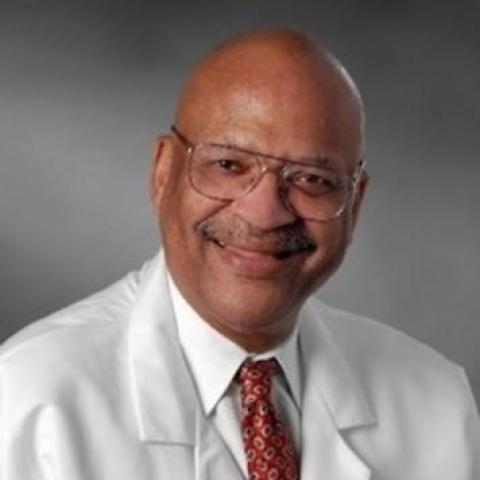"Eliminate the difference in healthcare between the poor and the rich" was Case Western Reserve University School of Medicine emeritus professor Edgar B. Jackson, Jr., MD (MED, 66) response to the medical school application question on why he wanted to pursue a medical career.
In the ensuing five decades, Jackson (CLC ’62, MED ’66) became a pioneering force tirelessly committed to narrowing the gap in healthcare disparities.
Today, the Case Western Reserve University and the broader healthcare community mourn the loss of Jackson, a revered clinical faculty member in the School of Medicine who died on Nov. 25 at the age of 88.
A Legacy Forged
Jackson, a double alumnus, earned his Bachelor of Arts in chemistry and Doctor of Medicine from CWRU. He was one of the first African American men to graduate from CWRU School of Medicine—notably serving as class president each year and graduating with honors.
Integral to Dr. Jackson's path to medicine was the mentorship of Dr. Lowell Orbison, a CWRU professor, who recognized and nurtured his potential and recruited him to work in his pathology lab. Highlighting the profound role of mentorship in shaping his life, Jackson said in a 2016 Crain's Cleveland Business article, which honored him as one of the "eight over 80", that Orbison was 'doing affirmative action before it had a name.' Jackson, in turn, paid it forward, providing mentorship to echo his commitment to dismantling racial barriers.
Joining University Hospitals in 1973, Jackson embarked on a distinguished career that spanned nearly four decades as a clinician, hospital system leader, educator and community leader. He was appointed associate chief of staff in 1991 and, subsequently, co-chief of staff and senior vice president for clinical affairs, a pivotal role in shaping healthcare delivery across the hospital system.
He continued to break barriers with his appointment in 1997 as the first African American chief of staff at a major academic medical center. Officially "retiring" from clinical practice in 2010, he continued to serve as chief of staff emeritus and senior advisor to the presidents and CEOs of both University Hospitals and University Hospitals Cleveland Medical Center.
He was a member of the National Academy of Medicine and was the second African American elected to the American Board of Internal Medicine's Board of Governors, which he served as director for a six-year tenure.
Legacy of Diversity
At the core of Jackson's legacy was his commitment to improving patient access for the underserved and expanding higher education and professional opportunities for those underrepresented in medicine (URIM).
A friend and colleague of Jackson’s for more than 60 years, Doris Evans, MD (MED '68), shares that throughout his career and life, he quietly confronted racism with quiet resilience. He understood the challenges for an African American man to succeed in medical school and as a physician.
"He had a keen desire to always be prepared," said Evans.
While his classmates might be taking a break from their studies, Jackson would be found studying.
"He was a lifeline for many people," said Evans.
When there was an immediate need for a very rare blood type for a pediatric patient in the early 1970s, Jackson was the one to volunteer and answer the need. Evans shares that at that time, however, the blood was for a Caucasian child, and the parents initially denied Jackson's offer for his blood donation. Evans consulting with the family was able to sway their concerns about their child receiving the blood, assuring them there would not be any detrimental effects from their child receiving blood from an African American. "Blood is blood," she told them.
The Edgar B. Jackson Jr., MD, Endowed Chair for Clinical Excellence and Diversity was established in 2004 to create an enduring legacy of breaking down barriers and championing diversity in medicine. One of its kind in the United States, the endowed chair stands as a perpetual testament to Jackson's unwavering commitment to promoting diversity among academic faculty.
Jackson also led the formation of the David Satcher Clerkship program director at University Hospitals—a national model for recruiting URIM medical students and served as its program director.
Beyond Hospital Walls: Community Engagement
Dr. Jackson's impact extended far beyond the walls of healthcare as he actively engaged in community organizations. His roles as the health director for the city of Shaker Heights and the first assistant dean of minority affairs at Case Western Reserve University underscored his unwavering commitment to community service, showcasing the transformative power of healthcare rooted in community engagement.
In June 2022, Dr. Jackson shared his inspiring journey to medicine in his autobiography, The Way Up and The Way Out. From his upbringing in Arkansas to becoming a physician leader in Cleveland, the narrative reflects not only a successful career but also a life dedicated to education, discipline and faith in God. His autobiography highlighted his resilience and pursuit of excellence that defined his inspirational life.
A Joyful Spirit and Compassionate Healer
In a message to the School of Medicine, Dean Stan Gerson shared, “Throughout his career, Dr. Jackson was a driving force in addressing healthcare disparities and was dedicated to helping change the health trajectory of the underserved. Dr. Jackson's legacy inspires us to continue the vital work he began, advancing healthcare, promoting diversity, and serving our communities with compassion and dedication.'"
Colleague Debra Anne DeJoseph, MD—shared, "He really was a great man and such a leader. He elevated the standard of practice for all of us".
He was a man of distinction and a natural leader," said Evans. "It was a joy and privilege to know him."


